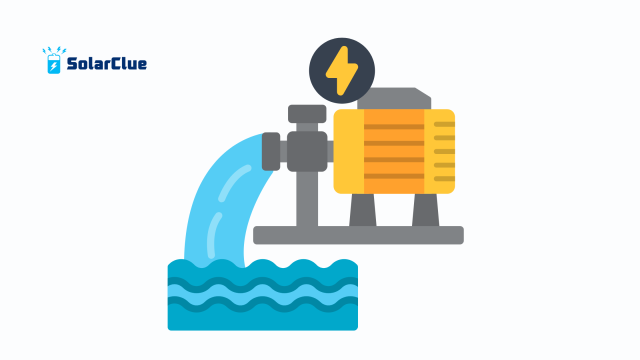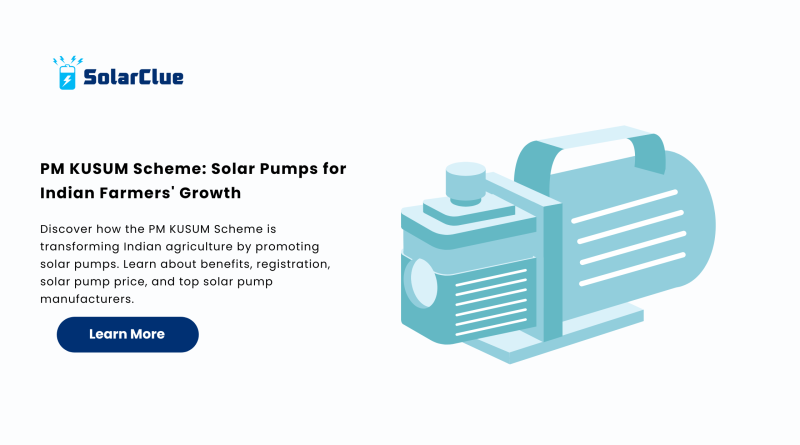PM KUSUM Scheme: Solar Pumps for Indian Farmers’ Growth
India’s agricultural backbone supports nearly 60% of its population. However, most farmers face challenges with energy access. Fortunately, the PM KUSUM Scheme (Pradhan Mantri Kisan Urja Suraksha evam Utthaan Mahabhiyan) is a revolutionary initiative by the Indian government. It empowers farmers through solar pumps and sustainable irrigation. In this blog, we’ll cover everything about the KUSUM Yojana, including how to apply, solar pump price, and why it’s a game-changer for Indian agriculture.
Table of Contents
- 1 What is the PM KUSUM Scheme?
- 2 Objectives of the KUSUM Yojana
- 3 Benefits of Solar Water Pumps for Farmers
- 4 Types of Solar Pumps Available Under the PM KUSUM Scheme
- 5 KUSUM Scheme Registration Process
- 6 Solar Pump Price and Subsidy Details
- 7 Top Solar Pump Manufacturers and Suppliers in India
- 8 How to Choose the Right Solar Pump
- 9 Importance of Solar Pump Efficiency
- 10 Role of Solar Pump Dealers in Implementation
- 11 Installation and Maintenance of Solar Pumps
- 12 Government Targets and Achievements Under KUSUM Yojana
- 13 Challenges and the Road Ahead
- 14 Conclusion
- 15 FAQs
What is the PM KUSUM Scheme?
The PM KUSUM Scheme is a flagship program by the Government of India aimed at promoting solar energy usage in the agricultural sector. Specifically, it encourages the installation of solar powered water pumps for irrigation, thereby reducing dependency on diesel and grid electricity. Launched in 2019, the scheme provides financial assistance to farmers for setting up solar irrigation systems. As a result, more farmers now have access to clean, affordable energy.
Objectives of the KUSUM Yojana
-
To ensure energy security for farmers and rural communities.
-
To increase the income of farmers by allowing them to sell surplus solar power to the grid.
-
To promote the use of clean and green energy in rural India.
-
To replace diesel pumps with high-efficiency solar irrigation pumps.
Benefits of Solar Water Pumps for Farmers
With the rising solar pump price, the KUSUM Yojana offers up to 90% subsidy for eligible farmers. As a result, solar pumps have become increasingly accessible. Here’s how they benefit farmers:
-
Significant reduction in fuel and electricity costs over time.
-
Minimal maintenance and long operational life, which means more peace of mind.
-
24/7 access to irrigation water without relying on erratic power supply.
-
Reduced carbon footprint and lower environmental impact.
Types of Solar Pumps Available Under the PM KUSUM Scheme
Depending on the water source and usage, different types of solar pumps are available. Each offers specific advantages. Therefore, it’s important to understand which type fits your needs best:
-
DC surface solar pumps: Ideal for shallow water sources and small farms.
-
AC submersible solar pumps: Better suited for deep borewells and high-demand irrigation.
-
Hybrid solar pumps: Equipped with battery backup to ensure performance even during cloudy weather.
Each type is selected based on the water depth, land size, and power needs. Hence, working with efficient solar pump manufacturers can help determine the best system for a farmer’s needs.
KUSUM Scheme Registration Process

Farmers interested in availing benefits under the KUSUM Yojana can follow these steps.
Firstly, visit the official site of your state’s renewable energy department or solarclue.com. Then, fill the online application form with land and ID proof. After that, select the type and capacity of the solar pump. Finally, wait for document verification and subsidy approval.
For more information on registration, visit blog.solarclue.com.
Solar Pump Price and Subsidy Details
The actual solar pump price varies based on capacity, type, and manufacturer. However, with the Indian government solar scheme, eligible farmers can get up to 90% subsidy. Below is a quick estimate:
-
3 HP solar pump: ₹1.5 lakh to ₹2 lakh (post-subsidy)
-
5 HP solar pump: ₹2.5 lakh to ₹3 lakh (post-subsidy)
Exact costs depend on the region and the selected solar pump suppliers or solar pump dealers. Therefore, it’s advisable to compare offerings from multiple suppliers.
Top Solar Pump Manufacturers and Suppliers in India
Choosing trusted solar pump manufacturers ensures reliability and efficiency. In particular, some of the top names include:
-
Tata Power Solar
-
Waaree Energies
-
Shakti Pumps
-
Kirloskar Solar
-
Lubi Solar
Most of these companies also offer certified solar pump installation services. As a result, farmers receive not just the equipment, but also reliable service support.
How to Choose the Right Solar Pump
To ensure optimal performance, consider the following before choosing your solar pump for farmers. First, evaluate your water depth and well yield. Then, think about crop type and irrigation method. Also, measure your daily water requirement. Lastly, check for consistent sunlight availability in your area. These steps will help you make an informed choice.
Importance of Solar Pump Efficiency
Solar pump efficiency is crucial for maximizing benefits. Efficient pumps reduce operational costs and enhance water usage. Therefore, always check for BIS certification, quality of solar panels, and pump motor ratings. Moreover, consult a certified technician to assess system compatibility.
Role of Solar Pump Dealers in Implementation
Authorized solar pump dealers not only supply but also assist in system design, installation, after-sales service, and navigating the KUSUM scheme registration process. In many cases, they also help farmers understand the best pump type for their land and crops. Consequently, farmers get comprehensive support from selection to operation.
Installation and Maintenance of Solar Pumps
Professional solar pump installation ensures maximum exposure to sunlight, appropriate tilting angles, and proper wiring. Once installed, regular maintenance involves cleaning solar panels and checking battery health (if applicable). Moreover, routine inspection prevents major breakdowns and improves lifespan. This means less downtime and more reliability.
Government Targets and Achievements Under KUSUM Yojana
The government aims to install 30.8 GW of solar capacity through this scheme by 2026. As of now, thousands of solar pumps have already been installed, transforming rural livelihoods across multiple states. This shows the increasing success and demand for solar energy in Indian agriculture. Furthermore, it reflects strong policy commitment toward renewable energy.
Challenges and the Road Ahead
Though impactful, the PM KUSUM scheme faces issues like slow disbursement of subsidies, lack of awareness, and technical challenges. However, addressing these can further expand the scheme’s reach and effectiveness. Going forward, streamlined processes and local awareness campaigns can enhance adoption. Additionally, training programs for farmers can improve efficiency and confidence.
Conclusion
The PM KUSUM Scheme has become a beacon of hope for India’s farmers, offering sustainable and cost-effective irrigation solutions through solar water pumps. With easier KUSUM scheme registration, efficient solar pump manufacturers, and generous subsidies, this initiative is reshaping India’s agricultural landscape. Embrace the change and explore more at solarclue.com and blog.solarclue.com.
FAQs
1. What is the subsidy under the PM KUSUM scheme?
Farmers can receive up to 90% subsidy on solar pump installations depending on their state policy.
2. Who can apply for the KUSUM Yojana?
Any farmer with cultivable land and a water source can apply under the PM KUSUM Scheme.
3. What is the average solar pump price?
Post-subsidy, the price ranges from ₹1.5 lakh to ₹3 lakh based on pump capacity.
4. How can I register for the KUSUM Yojana?
Visit your state renewable energy department or apply online at solarclue.com.
5. Which are the best solar pump manufacturers in India?
Top manufacturers include Shakti Pumps, Tata Power Solar, and Waaree Energies.
To power up your fields with clean, green energy, visit SolarClue.com – your trusted partner in sustainable farming!



